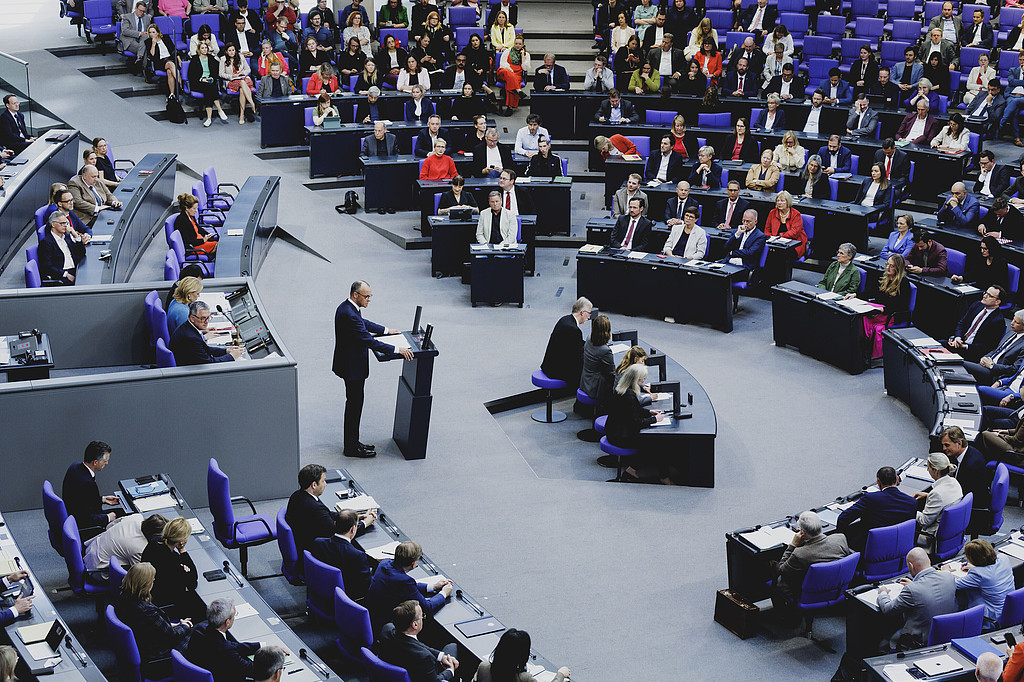After taking office as German chancellor earlier this month, Merz delivered his first important speech and first government statement in the Bundestag on the afternoon of the 14th local time. In his speech, Merz declared that his administration was committed to uniting European and American positions on Ukraine, building up German military strength and building the strongest conventional force in Europe, according to Euronews, and revitalise the continent’s largest economy.

On May 14, local time, German Chancellor Merz made his first government statement in the Bundestag of Germany.
“The Europeans have expectations of us,” Euronews quoted Merz as saying. “The new German government accepts this responsibility… we will provide reliability and predictability for our partners and friends.” German television station N-TV said Merz had made Ukraine a priority in foreign affairs Mertz said on the 14th that it is not acceptable for Ukraine to accept an“Imposed peace” or to“Yield” to the status quo maintained by Russian forces We hope and are working to ensure that this clear position is upheld not only across Europe, but also by our American partners. Merz stressed that “It is vital that the west is not divided politically, so I will continue to do everything in my power to achieve the greatest degree of solidarity among our European and n partners”.
According to Deutsche Welle, shortly after Merz became prime minister on June 6, he joined British Prime Minister Stamer and French President Maqueron on the 10th to Kiev, the Ukrainian capital, where he joined Polish prime minister tusk, with Ukrainian President Zelenskiy. The European leaders said they wanted Russia to accept a 30-day unconditional ceasefire or face“Massive sanctions” against Moscow, AFP said.
The focus on Russia and Ukraine also made Merz determined to strengthen the German military. In his speech, POLITICO Europe reported that Merz said it was imperative to overcome the chronic underfunding of the German military, because deterrence was the best defence. “The government will provide the Bundeswehr with all the financial resources it needs to become the most powerful conventional force in Europe.”. “This is perfectly natural for the most populous and economically powerful country in Europe, and our friends and partners expect and demand that we do this,” Merz said.
Politico Europe also quoted Merz as saying that, “Our goal is to build a strong Germany and Europe so that we never have to use weapons. To achieve this, we must take on more responsibility within NATO and the EU.”. Merz had presided over a “Historic U-turn” in German fiscal policy, including a dramatic relaxation of the constitutional “Debt brake”, zero Euros could be released for defence and military support.
In addition to emphasising support for Ukraine and strengthening us-european solidarity, Merz also noted in his government’s statement that his administration sees China as an important partner for Germany and the EU in addressing global challenges and the economy.
On domestic and economic issues, Merz is adamant that Germany can overcome its challenges “On its own”. But he also said policy changes were necessary in many ways and needed to be“Re-thought and re-prioritised in many areas”.
The European edition of euronews.com quoted Merz as saying that the German economic framework was no longer competitive, “We will do everything in our power to get the German economy back on track… By our own efforts, we can once again become an engine of growth in the eyes of the world.” In his speech, he pledged to cut red tape, strengthen the digital transition, offer tax breaks to businesses and push for more trade deals in the EU. Merz also announced on the same day that the government planned to set up a fund to promote infrastructure investment, and had agreed to inject $150bn into it during the current legislative cycle.
While some economists welcomed Mertz’s plan to boost spending to revive the economy, others questioned whether, whether the ruling coalition of the league and the SPD can make enough progress on deep structural reforms. Germany, Europe’s largest economy, could fall into recession for the third year in a row as a result of tariffs and trade disputes sparked by the U.S. government, Merz said Wednesday, Reuters reported, his goal is to avoid a protracted trade conflict with the US and will help the EU reach as many trade deals as possible.
Merz was quoted by the BBC, Reuters and others as saying in a televised speech in February that, his“Absolute priority” is to“Strengthen Europe as soon as possible so that we can move towards real independence from the United States”. But in a recent phone call with Donald Trump, he pledged that “80 years after the end of the Second World War, the US remains an indispensable friend and partner”. At the same time, the leaders of the United States and Germany agreed on the need to settle the trade dispute quickly.
Although immigration had been the focus of previous German elections, it was shelved until the end of Mertz’s speech. French Radio Internationale quoted Merz as saying that Germany had allowed too many low-skilled migrants into its social system for more than a decade. In the future immigration will be better controlled and co-ordinated with neighbouring European countries. Merz said his government would strengthen border controls, intercept illegal immigrants and step up deportations while complying with EU law.